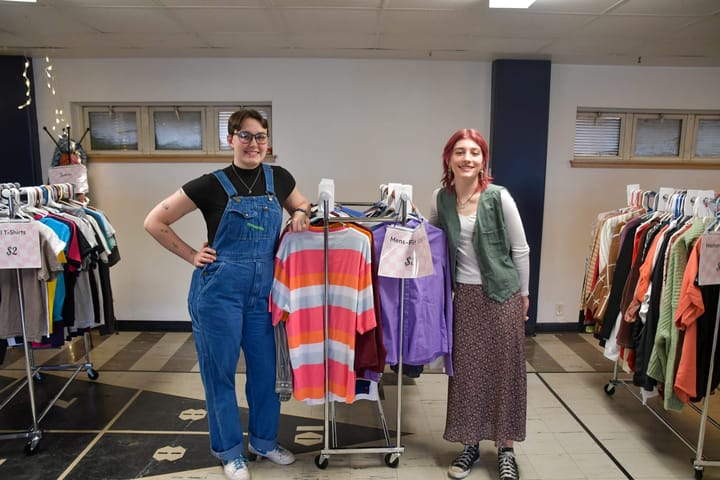‘Our names are our identity’: Students gather to remember the names of the victims of the Atlanta shooting
Sophomore Harley Tran’s voice rang out clear and steady to the crowd of students gathered on the commons patio.
“Soon Chung Park, Hyun Jung Grant, Delaina Ashley Yaun, Suncha Kim, Yong Ae Yue, Xiaojie Tan, Daoyou Feng, Paul Andre Michels.”
While she spoke, the attendees moved through a line, each placing a lit candle next to the plaque and flowers set to commemorate the victims of the Atlanta shooting. To these students, who had gathered for the vigil Friday, April 9, these names matter.
These eight names are those of the people, six of them of Asian descent, who were murdered in the March 16 mass shootings at three massage parlors in Atlanta, Georgia.
The event, hosted by the Asian Student Organization (ASO), the Augustana Student Association (ASA), Lost & Found, and Diversity and Inclusion, reflected on hate against Asians and its history and contemplated actions students could take to stop hate and discrimination against Asian American and Pacific Islander (AAPI) individuals and to support their Asian friends.
“Augustana is most definitely not untouched by anti-Asian sentiment,” Sara Alhasnawi, sophomore and ASO senator, said at the event.
The seven speakers also used the vigil gathering as a call to action for the attendees, about 60 in person and about 50 on the livestream.
“I think sometimes it seems like the issue isn’t there when it’s not addressed, which is why I think this event is going to be so important to show that just because it happened down in Georgia doesn’t mean that South Dakota is doing okay,” Alhasnawi said in an interview. “Augustana might be going through the same thing, even if it’s not to the same level.”
The event began with opening remarks by Alhasnawi, who was an organizer of the event.
“How many of you asked any of your Asian-looking friends what their real name was when they gave you their English name?” Alhasnawi said.
She cited that there have been nearly 4,000 Asian hate crimes in the past year, according to the organization Stop AAPI Hate. She added that the myth of the “model minority” harms the AAPI community by diminishing their struggle as a systemically oppressed group.
Then Ericka Kim, junior and ASO operations officer, took the mic on behalf of ASO to express thankfulness for allies and community support, show the group’s support and solidarity for the wider AAPI community and remember and mourn the eight lives lost.
“I wanted to be thankful for our audience, who was predominantly white, but not be the Asian stereotype of being white people’s servants and just being submissive to them,” Kim said in an interview.
She said she felt sad and angry when she found out about the shooting but because of the prevalence of anti-Asian sentiment was not completely shocked.
So she hoped to reflect that in her statement at the event.
“[I was] making sure the Asian community felt heard and that their hurts were not overlooked,” Kim said.
Sophomore Barsha Shah shared her experience having her struggles minimized and facing the harmful stereotypes that some have about Asian people.
“Because I am soft spoken, because I am petite, because I speak the white man’s tongue in ways that appease you, I am unthreatening,” Shah said. “So my body has become a vessel of my pain and trauma, and I call it bravery and activism.”
She called for allies on campus to take on more of the burden in dismantling the systems of oppression and to work actively with their Asian peers.
“When you see someone who looks like you being at the other end of a bullet by a white man,” senior Angelina Gibson said, “some people know that pain well.”
Gibson, who spoke next, shared her experiences of racism for being an Asian woman.
“I’ve been made fun of, fetishized, at 19 years old by being told that I should invest in a rice hat so I can do yard work in the summer,” Gibson said. “I was told by a restaurant manager when I wore red and put my hair up for a job at 18 years old, he asked me who I was trying to attract by wearing that color.”
After Gibson, ASA President Cole Tessendorf shared a message expressing grief and solidarity and condemning racism and violence, especially against AAPI people.
After that, Tran, ASO events coordinator, spoke about Asian names. Many Asian people, including herself, may choose to take on an English name in the United States for a number of reasons, including societal acceptance, pronunciation or racism in job hiring practices, Tran said.
But she emphasized the importance of their given Asian names.
“Our names are our identity, our heritage,” Tran said. “It’s what we have left that reminds us who we are, where we come from.”
Tran also expressed anger that the names of the victims had been commonly misspelled in mass media.
“Respecting the victims in the Atlanta shooting means getting their names right,” she said.
Hailey Nold, president and founder of Lost & Found on campus, named some of the feelings many have been having around the attack: vulnerability, fear, grief, depression or hopelessness. She also pointed to mental health resources for anyone struggling with these feelings who wants to seek out help.
Following the speeches and the candle lighting, students were invited to sign posters that declared “How will you commit to being anti-racist?” They responded with goals like having tough conversations, speaking up against injustice and educating themselves.
Below are more photos from the event. All photos by Camryn Hay.









































